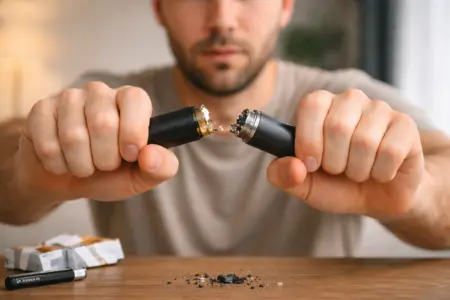Table of Contents
According to the Centers for Disease Control (CDC), 11.4% of children aged 3-17 years old have attention deficit hyperactivity disorder (ADHD). That may not sound like a very large percentage, but it equates to about 6 million kids.
From 2016 – 2019, 12 to 17-year-olds had the highest prevalence of ADHD at 13% (3.3 million teens). Six to eleven-year-olds came close behind with an ADHD prevalence of 10% (2.4 million children).
Luckily, there are medications like Concerta to help manage the symptoms of ADHD. But if you have never heard of or used Concerta before, you may have a lot of questions. And that is why we’ve created this guide.
Are you curious about Concerta and how it can help you or your child manage ADHD? Then keep reading this complete guide to Concerta for answers to all your most important questions.
What Is Concerta?
Concerta is a medication for attention deficit hyperactivity disorder (ADHD). Its main ingredient is methylphenidate, which is a stimulant. Stimulants include legal compounds like caffeine as well as illicit substances like cocaine.
Scientists discovered methylphenidate in 1944. Only about a decade later, in 1954, the first ADHD medication, Ritalin, became available to consumers.
Doctors originally prescribed Ritalin to help treat exhaustion and depression. Over time, “hyperactivity” became a common concern among parents.
So, in 1955, the FDA approved Ritalin and other methylphenidate-containing drugs for the treatment of ADHD.
Stimulants work for ADHD because they can help increase attention and focus. Certain stimulants like methylphenidate can also help with behavioural problems, organisation, and even listening skills.
Concerta is a legal stimulant when you get it from a doctor or pharmacist. Doctors can prescribe Concerta and its generic forms to treat ADHD.

Download Our Brochure
How Strong Is Concerta?
Concerta comes in four strengths:
- 18 mg
- 27 mg
- 36 mg
- 54 mg.
Most children will start on the lowest dose. Then, the child’s doctor may increase the dose as needed. A doctor should only increase a child’s dose if he or she does not respond to the lower dose.
Adults usually start with 18 mg, too. However, some people with ADHD who have taken other methylphenidate-based drugs (e.g., Ritalin and Daytrana) may require a prescription of 36 mg or more.
Children aged six to twelve years old can only take up to 54 mg of Concerta per day. In some cases, adults can take more than that. A doctor will likely prescribe two 36 mg tablets per day, adding up to 72 mg in total.
Compared to other ADHD prescription medications, Concerta tends to offer the longest-lasting effects. It also offers a steadier release over time. This is why most people only take Concerta once per day.
How Long Does It Take for Concerta to Kick In?
Concerta usually starts working within one hour of taking it, though some people report feeling its effects in as few as 45 minutes.
People should feel the maximum effects from Concerta in about six hours or up to ten hours after taking it.
How Long Does Concerta Last?
Concerta uses its proprietary OROS delivery system. It is the only ADHD medication that uses this system. OROS results in an extended-release drug that releases the active ingredient increasingly throughout your day.
A single dose of Concerta can last up to 12 hours. This is due to Concerta’s extended-release formulation, which causes a small amount of the drug to go into your bloodstream throughout the day.
Is Concerta a Controlled Substance?
Concerta contains the active ingredient, methylphenidate, which is a controlled drug. As such, you may be asked to show proof of identity when collecting your prescription. You also have to collect your prescription within 28 days.
What Is Concerta Used for?
Concerta is used for the treatment of ADHD. It helps with symptoms like impulsivity and inattention. Doctors typically recommend this medication alongside behavioural interventions.
Doctors recommend that children under 6 years of age who can not use Concerta focus on behavioural interventions via therapy.
Concerta is also used for other disorders, including narcolepsy, Parkinson’s disease, and more.
What Does Concerta Do to the Body?
Concerta is a stimulant that acts on the central nervous system (CNS). The CNS includes the brain and the spinal cord.
More specifically, Concerta influences CNS levels of the neurotransmitters norepinephrine and dopamine. Neurotransmitters act as messengers in the brain. And each one is associated with a different behaviour or bodily function.
For example, norepinephrine regulates our flight-or-fight response, but it also impacts our heart rate and even leads to increased blood pressure.
Dopamine, on the other hand, regulates the brain’s reward system and plays a role in learning and memory.
But how does Concerta influence these neurotransmitters exactly? To understand its mechanism of action, we first need to explain how neurotransmitters work.
Get Help For Addiction

Dopamine and Norepinephrine
Neurotransmitters like dopamine and norepinephrine live inside our neurons (the cells of the CNS). When one neuron wants to deliver a message to another neuron, it releases neurotransmitters.
But once those neurotransmitters get released and deliver the message to the second neuron, the first neuron needs them back to send more messages.
The process of sending neurotransmitters back to the neuron where they originally came from is known as reuptake.
Concerta’s active ingredient is methylphenidate, a chemical that can block the reuptake of norepinephrine and dopamine. It does so by interacting with norepinephrine and dopamine transporters. The transporters take the neurotransmitters back to the neuron from which they originated.
When Concerta blocks reuptake from happening, that means there is more dopamine and norepinephrine circulating around the brain. This increase in these two neurotransmitters then helps with the symptoms of ADHD.
Because Concerta is an extended-release drug, it increases levels of these neurotransmitters throughout the day. That means you get more of the effects from dopamine and norepinephrine.
How Does Concerta Make You Feel?
Concerta should improve your impulsivity and inability to pay attention. This effect will lead to the following:
- Increased focus
- Better attention span
- Improved alertness.
There are also some side effects of Concerta. For instance, taking Concerta may increase your internal body temperature, leading to excessive sweating. This is a common symptom among many stimulants and stimulant medications.
Other side effects include dry mouth, decreased appetite, nausea, hangover-like headaches, difficulty sleeping, irritability, and dizziness.
In rare cases, Concerta can cause hallucinations, seizures, and psychosis. People who are already prone to these conditions should not take Concerta for this reason.
Because Concerta is a stimulant, doctors typically do not recommend it for people with anxiety, either.
Does Concerta Make You Feel High?
Concerta can make you feel high, especially if you are on the wrong dose. Concerta impacts dopamine levels. And if dopamine levels rise too quickly, it can result in a “high.”
As with most drugs that interact with dopamine levels, Concerta does have some potential for abuse. Quitting Concerta suddenly can also result in withdrawal symptoms like insomnia, tiredness, and depression.
Never stop taking Concerta without a doctor’s recommendation. Your physician can help you taper off your prescription. That way, you will avoid any dangerous or uncomfortable withdrawal symptoms.
Concerta Misuse
Concerta increases levels of dopamine in the central nervous system. Because dopamine helps regulate feelings of reward in the brain, using it can feel highly pleasurable. As a result, Concerta has the potential for misuse and addiction.
Drug misuse occurs when people who do not have a prescription use prescription medicine. For example, many people who do not have ADHD misuse Concerta for its stimulant effects.
More than 1.7 million people aged 12 years or older report misusing stimulants like Concerta. These individuals are often college students or graduates looking to improve their wakefulness and attention to boost their grades.
Over time, misusing stimulants like Concerta can lead to addiction. Addiction is also known as substance use disorder (SUD). Individuals with Concerta SUDs may experience cravings, increased tolerance, and withdrawal symptoms.
Some people who do have a Concerta prescription can still develop a drug addiction or dependence. However, this is not considered a SUD because the person has a prescription for Concerta.

Does Concerta Work the First Time You Take It?
Yes, Concerta does typically work upon the first dose. Then, it will last for up to 12 hours. However, this will vary by person.
For example, people who have taken methylphenidate-containing drugs previously may not respond to a low dose of Concerta. This is due to tolerance. Tolerance occurs when the same dose of a drug stops working. Then, you must take increasing doses of medication to achieve the same effects.
If you have been taking a high dose of Ritalin or another methylphenidate-containing drug before you switch to Concerta, this could be an issue for you. In that case, you and your doctor can increase the number of milligrams you take until you achieve the most robust effects at the lowest possible dose.
Is Concerta the Same as Adderall?
Concerta and Adderall both help treat and manage the symptoms of attention deficit hyperactivity disorder (ADHD). They are both CNS stimulants, and they come with very similar side effects. However, they are not the same medication.
Concerta’s active ingredient is methylphenidate. As we have explained, methylphenidate prevents the reuptake of norepinephrine and dopamine. This results in higher levels of these neurotransmitters impacting the brain.
Adderall does not contain methylphenidate. Instead, its active ingredients are a mixture of amphetamines. Amphetamines are controlled drugs that have a high potential for abuse and require a prescription.
Concerta vs. Adderall Effects on the Body
Concerta’s and Adderall’s active ingredients also have similar mechanisms of action. They both block the reuptake of neurotransmitters.
But while Concerta only affects norepinephrine and dopamine, Adderall regulates these neurotransmitters in addition to serotonin.
Serotonin is also a neurotransmitter. It helps deliver messages from neuron to neuron. Usually, serotonin influences behaviours like attention. It also helps with body temperature, digestion, blood flow, and even breathing.
In Adderall’s case, the increase in serotonin helps improve the attention span. A decreased ability to pay attention is one of the hallmark symptoms of ADHD.
Concerta vs. Adderall Strengths
Concerta only comes in extended-release form. It offers dosages of 18 mg, 27 mg, 36 mg, and 54 mg. Doctors may also prescribe two doses of 26 mg per day for a total of 72 mg of Concerta.
Adderall, on the other hand, comes in immediate- and extended-release tablets. The extended-release tablets come in 5 mg, 10 mg, 15 mg, 20 mg, 25 mg, and 30 mg doses.
The extended-release tablets work similarly to Concerta. The difference is that Concerta releases increasing amounts of the drug as the day goes on. Adderall releases the same amount of its active ingredients throughout the day.
The immediate-release form of Adderall delivers all the active ingredients at once. This can make immediate-release Adderall more prone to misuse.
Immediate-release Adderall comes in 5 mg, 7.5 mg, 10 mg, 12.5 mg, 15 mg, 20 mg, and 30 mg doses.
Concerta vs. Adderall Potential for Misuse
Concerta and Adderall have a high potential for misuse. You can get addicted to Adderall and Concerta.
As mentioned, immediate-release Adderall can increase your risk of developing dependence.
If you have a history of ADHD medication dependence or substance use disorder, tell your doctor. He or she can help you find the right type of Adderall for your needs.
Is Concerta the Same as Ritalin?
Like Concerta, Ritalin is a prescription treatment for ADHD that contains the active ingredient methylphenidate. This confers the following similarities between the two different drugs:
- They are both controlled drugs with a high potential for misuse
- It is illegal to use, buy, or possess Ritalin and Concerta without a prescription
- They have similar side effects
- Quitting Ritalin or Concerta suddenly can lead to withdrawal symptoms
- They both lead to increased levels of dopamine and norepinephrine in the CNS.
There are a few big differences between Concerta and Ritalin when it comes to strengths and release format. We will talk about this next.
Concerta vs. Ritalin Strengths
Concerta comes in extended-release tablets of 1854 mg. A doctor can also prescribe two doses of 36 mg for a total of 72 mg of Concerta.
Ritalin only comes in 5 mg, 10 mg, and 20 mg. The sustained-release and long-lasting release tablets, which we will talk about next, come in strengths of 10 mg, 20 mg, 30 mg, 40 mg, and 60 mg.
But why are Concerta dosages so much stronger than Ritalin? Concerta only comes in extended-release forms. They release the drug throughout the day instead of all at once. That means you can take more.
Concerta vs. Ritalin Release
Concerta is an extended-release drug designed to last up to 12 hours. You only have to take one dose per day to feel the effects all day. But Ritalin is different.
Ritalin comes in three release formats:
- Immediate release: lasts up to 4 hours
- Sustained release: lasts 68 hours
- Long-lasting release: lasts up to 8 hours.
As you can see, none of these forms lasts as long as Concerta. That is because doctors usually prescribe patients to use Ritalin 23 times per day, 30 to 45 minutes before taking a meal.
What Are Normal Doses of Concerta?
The recommended starting dose of Concerta depends on the person’s age and specific medical history. Obviously, a younger person or person recently diagnosed with ADHD would need less Concerta. An adult who has been taking ADHD medications for many years might need a higher dose.
Doctors recommend that children under 6 years old not take Concerta. Children aged 6 to 12 years old can take up to 18 mg of Concerta per day. In very rare cases, a doctor may prescribe up to 54 mg per day of Concerta for children in this age group. This usually occurs if the child’s symptoms are very severe and do not respond to lower doses.
Teens aged 13 to 17 years old should begin with 18 mg of Concerta per day. The highest recommended dose for this age group is two 36 mg tablets per day for a total of 72 mg of Concerta. Doctors recommend that patients in this age group not exceed 2 mg of Concerta per kilogram of weight per day. That means teens weighing less than 80 pounds should take less than 72 mg per day.
Adults up to 65 years old should start with 18 – 36 mg of Concerta per day. However, a doctor can prescribe up to 72 mg per day.
People who are new to methylphenidate-containing drugs will likely start at 18 mg. People who have used methylphenidate before may need 36 mg to start. Methylphenidate-based drugs include Ritalin.
There is no weight requirement for people in this age group. A doctor can prescribe even higher doses of Concerta if your ADHD symptoms do not respond to the initial dose.

What Are the Most Common Side Effects of Concerta?
The most common side effects of Concerta occur in greater than 10% of people who use this medication. These side effects include but are not limited to the following:
- Dry mouth
- Nausea
- Lower appetite, which may or may not lead to weight loss
- Headaches
- Inability to sleep
- Dizziness, increased blood pressure, and sweating are also common side effects of using this stimulant.
There are also known but rare side effects of Concerta use. Tell your doctor if you experience any of the following symptoms:
- Decreased blood flow to your extremities, which may include pain, coldness, numbness, and even changes in skin colour
- Unusual and unexplained wounds to the extremities
- Irregular or rapid heartbeat
- Mental health changes, mood changes, and behavioural changes, including mood swings, thoughts of suicide, or aggression
- Loss of control of your muscles, including shaking or twitching
- Vision changes like blurred eyesight
- Tourette’s-like outbursts that did not occur before taking Concerta
- Hallucinations and seizures – some people prone to psychotic episodes may experience more episodes while using Concerta.
Some children who have never expressed psychotic tendencies may begin to showcase them early due to Concerta use.
How Does It Feel When Concerta Is Working?
You’ll know your Concerta prescription is working when you feel more focused, in control of your emotions, and less hyperactive. Yet, Concerta can be difficult to tell when it is working because it uses an extended-release format.
So, to identify if your Concerta prescription is effective or if you need an increased dose, you first need to understand your goals.
For example, do you want your medication to help you stay focused during a class lecture? If so, you will know your Concerta is working when you can pay attention throughout the lecture.
Before you start using Concerta, jot down a list of your top 35 symptoms. The symptoms that concern you the most might include restlessness, mood swings, emotional reactivity, impulsivity, and procrastination.
Then, rate the improvement in your top symptoms when you take Concerta. Rate your improvement on a scale of 1– 10. If you score 7 – 10, the odds are that your medication is working.
How Long Does Concerta Stay in Your System?
Concerta’s effects can last for up to 12 hours, but it will stay in your system for much longer. That is because a drug’s effects wear off long before the drug decays in your body.
How long a drug stays in your system depends on its half-life. A drug’s half-life is the amount of time it takes for a drug to break down to half its original amount.
Concerta has a relatively short half-life of 3.5 hours. But that does not mean it goes away after 7 hours.
Let’s say you take 18 mg of Concerta per day. After 3.5 hours, only 9 mg of Concerta will still be in your system. After another 3.5 hours, 4.5 mg of Concerta will still be in your system.
Every 3.5 hours after that, the amount of Concerta in your system will decrease by half. Of course, because Concerta is an extended-release drug, the math gets a bit more complicated. But hopefully, you get the gist.
For the average person, it typically takes about 48 – 96 hours to get Concerta out of your system completely.
Can You Get Withdrawal Symptoms from Concerta?
Yes, you can become dependent on prescription Concerta. If you stop using this medication suddenly, you may experience Concerta withdrawal symptoms.
A drug’s withdrawal symptoms are usually the opposite of its medicinal effects. So, since Concerta is a stimulant, its withdrawal symptoms are the opposite. Common withdrawal symptoms experienced after quitting Concerta include:
- Fatigue
- Vivid dreams
- Movement disorder
- Increased appetite.
Also, using high doses of Concerta can make you feel “high,” a feeling known as euphoria. So, quitting Concerta can make you feel dysphoria. Dysphoria has a lot in common with depression.
If you want to avoid these withdrawal symptoms, make sure to use your medication as directed. And never take Concerta without a doctor’s prescription.
Never stop using Concerta without a doctor’s approval. Your doctor can progressively lower your daily dose to prevent these side effects. This is a method known as tapering.
What Is the Concerta Crash?
You have probably heard of a caffeine crash before. But have you heard of the Concerta crash? Concerta crashes occur in all kinds of people, from those who are new to this medication to people who use Concerta daily.
A crash is essentially a collection of withdrawal symptoms. A Concerta crash usually happens when your medication wears off, especially in the evening.
You may experience trouble concentrating, irritability, or exhaustion during a Concerta crash. But the good news is your Concerta crash should wear off once you take the next day’s dose of your medication.
Foods to Avoid When Taking Concerta
Never use alcohol when you are taking Concerta. Alcohol could prevent your Concerta from working as prescribed. Using alcohol and Concerta may also lead to an increased risk for negative side effects.
You should also avoid using caffeine alongside Concerta. Like methylphenidate, caffeine is a stimulant. Taking these two stimulants together can lead to an increased risk of insomnia, heart palpitations, nervousness, and more.
There is some evidence that highly acidic foods could interact with ADHD medications, including Concerta. If you are worried about this problem, avoid having acidic foods and drinks when taking Concerta.

Discover How We Can Help You
What Should I Avoid While Taking Concerta?
Concerta can lead to false positives and negatives on brain scans. If you have Parkinson’s disease and need a brain scan, tell the laboratory staff about your Concerta use.
There are also some Concerta interactions to consider when taking this prescription drug. Tell your doctor if you take the following drugs before taking this ADHD medication.
MAO Inhibitors
Monoamine oxidase (MAO) inhibitors are prescription drugs that help treat the symptoms of depression. But taking them while using Concerta can lead to a fatal drug interaction, fatal, meaning deadly.
MAO inhibitors to avoid while on Concerta include:
- Isocarboxazid
- Linezolid
- Metaxalone
- Methylene blue
- Moclobemide
- Phenelzine
- Procarbazine
- Rasagiline
- Safinamide
- Selegiline
- Tranylcypromine.
Do not stop taking your MAO inhibitor without speaking to your doctor first. Together, you and your physician can figure out a treatment plan that best fits your unique needs.
Dexmethylphenidate
Dexmethylphenidate is another prescription drug ingredient used for the treatment of ADHD. Brands like Focalin and its extended-release tablet contain dexmethylphenidate as an active ingredient.
Like methylphenidate, dexmethylphenidate is a CNS stimulant. It works very similarly to Concerta.
Taking these drugs together may lead to an overdose. You should avoid using these two ADHD medications at the same time.
Most Common Questions About Concerta
We have answered a lot of the internet’s most-asked questions in this guide. But here are a few more frequently asked questions about Concerta that you may be searching for.
Who Should Not Take Concerta?
Concerta is not for everyone. It is not approved for the treatment of children under the age of six years. If you have one of the following conditions, your doctor likely will not recommend this medication:
1. Anxiety disorders, general agitation, or panic attacks
2. Hypersensitivity to stimulants, in general, or methylphenidate, in particular
3. People with glaucoma
4. Individuals with tics or Tourette’s syndrome.
People with bipolar disorder may also want to avoid using Concerta. In some cases, Concerta can trigger a manic episode. However, you may be protected from this possibility if you use a mood stabiliser.
If you have a history of prescription drug dependence or substance use disorder, your doctor may not recommend this medication.
Individuals with high blood pressure
Does Concerta Pass Through the Body Intact?
If you find pieces of or the whole Concerta capsule in your waste, don’t stress. The makers of Concerta designed the capsule to pass through your digestive system without dissolving.
Is Concerta Safe?
Concerta is safe when used as clinically intended for the treatment of ADHD. Concerta is also safe when you use this prescription drug according to your doctor’s recommendations.
Misusing your Concerta medication can lead to serious issues with your blood pressure and cardiovascular system. Abuse of Concerta commonly leads to dependency and substance use disorders.
Experts You Can Trust
With a wealth of knowledge and services to help you regain control of your life, request a call-back from one of our professionals today. The choice you make today could change your life forever.


